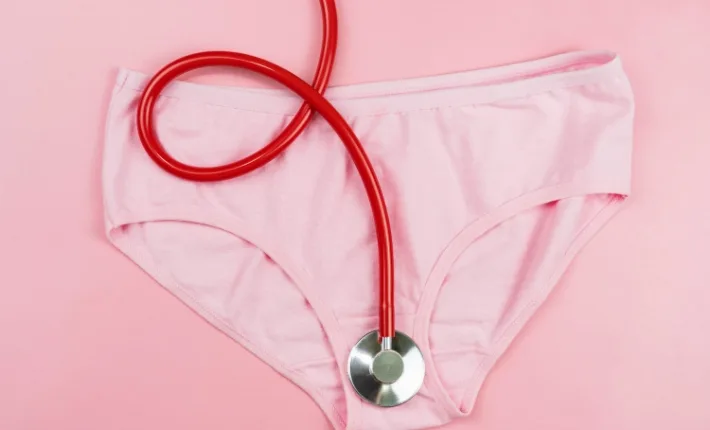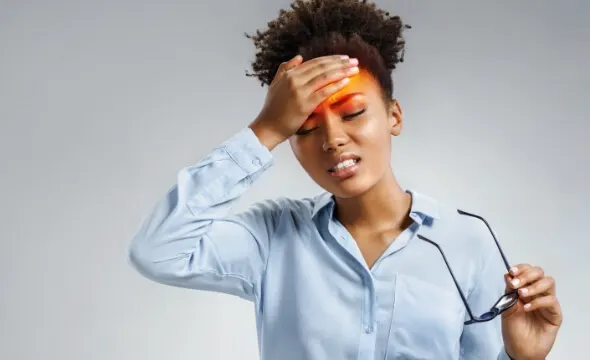Common Menstrual Problems You Need To Know!

Do you experience extreme period pain or heavy bleeding during your cycle? Or do your periods delay or occur frequently than usual, causing irregular periods? If your answer is yes to either of the questions, you might be dealing with a certain period problem.
As you know, menstruation is your body's indication that your reproductive organs are working properly. But when symptoms like vomiting during periods, spotting between periods, missed periods and cramping occur, it's time to pause and detect for menstrual problems. These period problems can range from being easy to a serious medical condition. Thus, being aware of menstrual disorders and sighting the symptoms is quite important


What's Normal And What's Not?
Typically, there are three prime instances where irregular periods can be considered or categorised as 'normal'. The very first one is menarche - your first period, next the periods that you experience post a miscarriage and lastly periods before menopause. Apart from these times, if your periods delay under any other circumstances, then you might be facing some menstrual disorders.


Types Of Common Period Problems


Amenorrhea

Amenorrhea is a period problem wherein one doesn't get periods
Amenorrhea is a period problem wherein one doesn't get periods. There are two sides to this condition, first, if you don't experience periods even after going through puberty it's called primary amenorrhea and second, if you don't get regular periods for six months or more, it's called secondary amenorrhea. The reason behind this menstrual problem could be a failure of the ovaries or an issue with the pituitary gland. Either way, you should consult with a doctor and find the right diagnosis and treatment for it.


Menorrhagia
Heavy periods also known as menorrhagia is a condition that causes you to bleed more than normal. It's a menstrual disorder that might prolong your periods for more than seven days and makes you change pads every hour or so. The cause behind this period problem is hormonal imbalance. With menorrhagia, you might experience severe period pain that would restrict you from carrying out your day-to-day activities. In such cases, using thick pads for heavy flow is the best option. Try out the ALWAYS Maxi Thick Pads which provide maximum coverage through their anti-leakage barriers. Additionally, the extra-absorbent core absorbs liquid and keeps you dry and protected. If you use tampons, ALWAYS TAMPAX Cardboard Tampons should be in your period kit. It's quick-absorption channels and a cardboard applicator deliver leak-free protection which lasts for up to eight hours. On the other hand, the anti-leak skirt provides additional protection and the anti-slip grip allows easy insertion.


Dysmenorrhea
Apart from experiencing varied blood flow, another period problem witnessed by many women is extreme period pain. Painful periods also known as dysmenorrhea is caused by the muscle contractions that occur in your uterus while menstruating as it sheds its lining. Apart from being a period problem, dysmenorrhea could also be a sign of an underlying disease like fibroids, endometriosis or pelvic inflammatory disease (PID).


Premenstrual Syndrome (PMS)
Premenstrual syndrome (PMS) is a condition that typically occurs one or two weeks prior to your periods. It's caused due to a change in hormones and serotonin levels. It's noted that PMS causes mood swings in females. Other than that, PMS symptoms include, bloating, headaches, anxiety, irritability, acne, food craving and mild stomach cramps. These symptoms can occur in any month and the severity of each would also vary. Until and unless it doesn't hinder your regular activities, there's no need to stress about it.


Treatment And Diagnosis Of Menstrual Problems
As most menstrual problems are largely associated with hormones and other internal factors, consulting with a doctor should be your first step. To make a better diagnosis doctor would need all the symptoms you have been experiencing and the duration of your menstrual cycle. These factors would allow the doctor to conclude whether you are dealing with something normal or not. He might even ask you to go through a few blood tests and a pelvic exam. Upon the finding, he will be able to provide you with the required treatment.

Based on your current lifestyle, your body might lead you into an irregular period cycle.
The Bottomline
Based on your current lifestyle, your body might lead you into an irregular period cycle. In some cases, it might be normal but if you experience heavy blood flow or severe period pain, seeking medical attention is highly advised.
Frequently Asked Questions


What causes heavy periods?
Hormonal imbalance, uterine fibroids, dysfunction of the ovaries and polyps are some of the main causes behind heavy periods.


What is PMS?
Premenstrual syndrome (PMS) is a condition which is experienced by a female just before her periods. This condition causes multiple changes in your body and sometimes can hinder with your day-to-day activites.


What are PMS symptoms?
PMS symptoms include mood swings, food cravings, fatigue, depression, tender breasts and irritability.
Understanding your cycle is essential for managing your health. Learn how do you calculate next period date with ease in our helpful guide
Try our ovulation cycle calculator to track your days and plan your fertility window.
Disclaimer
Please note the date of last review or update on all articles. No content on this site, regardless of date, should ever be used as a substitute for direct medical advice, diagnosis or treatment from your doctor or other qualified clinician. Always is committed to ensuring that all of our products meet rigorous safety standards; Always pads prioritize safety, protection and comfort of its consumers.








